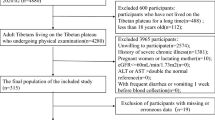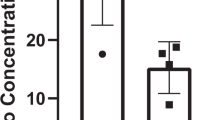Abstract
WHEN humans reach a high altitude there is a marked reduction in the rate of urinary excretion of aldosterone with a slow return to normal1. These changes account for the parallel decrease and increase in rates of salivary and urinary excretion of potassium and sodium respectively. A difference of about a factor of three in the ratio of salivary sodium to potassium has been observed for an altitude as low as 2,400–3,000 m compared with values near sea level. Because of the marked chemical similarity between potassium and caesium, a transitory change in the rate of excretion of caesium might be expected to accompany a change in altitude, and we have observed such an effect in a volunteer who was on an exchange visit from Harwell (altitude 100 m) to Los Alamos (altitude 2,200 m).
This is a preview of subscription content, access via your institution
Access options
Subscribe to this journal
Receive 51 print issues and online access
$199.00 per year
only $3.90 per issue
Buy this article
- Purchase on Springer Link
- Instant access to full article PDF
Prices may be subject to local taxes which are calculated during checkout
Similar content being viewed by others
References
Ayres, P. J., Hurter, R. C., Williams, E. S., and Rundo, J., Nature, 191, 78 (1961).
Rundo, J., Brit. J. Radiol., 37, 108 (1964); Boni, A. L., Nature, 222, 1188 (1969).
Author information
Authors and Affiliations
Rights and permissions
About this article
Cite this article
RUNDO, J., RICHMOND, C. Altitude Effect on the Biological Half Life of Caesium in Man. Nature 225, 83–84 (1970). https://doi.org/10.1038/225083a0
Received:
Revised:
Issue Date:
DOI: https://doi.org/10.1038/225083a0
Comments
By submitting a comment you agree to abide by our Terms and Community Guidelines. If you find something abusive or that does not comply with our terms or guidelines please flag it as inappropriate.



